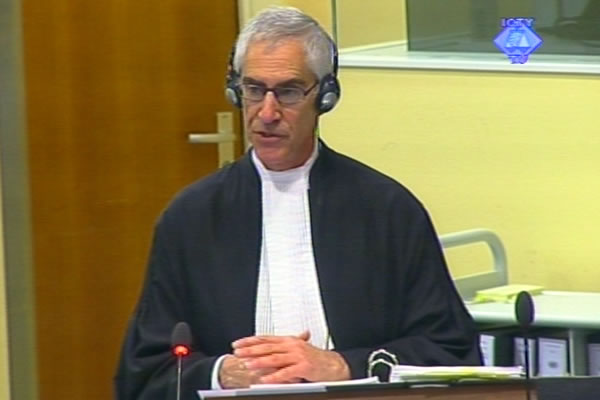Home
GENOCIDE, BAKER FROM PRIJEDOR AND HOW TO ENROL IN HARVARD
The prosecution contends there is plenty of evidence that Karadzic is responsible for the genocide in the municipalities. Karadzic shared the genocidal intent with other members of the joint criminal enterprise, the prosecutor insisted, corroborating the claim by invoking a putative baker from Prijedor. Karadzic’s legal advisor Peter Robinson compared the OTP’s efforts to prove that genocide was committed in the municipalities with the futile efforts of an untalented student to enroll in Harvard
 Alan Tieger, prosecutor at the Radovan Karadzic trial
Alan Tieger, prosecutor at the Radovan Karadzic trial The prosecution contends that during its case sufficient evidence was called to allow any reasonable trier of fact that Radovan Karadzic was responsible for the genocide in Bratunac, Foca, Kljuc, Sanski Most, Prijedor, Vlasenica and Zvornik and that he shared genocidal intent with other members of the joint criminal enterprise whose goal was to physically annihilate Bosnian Muslims.
At a hearing on the prosecution’s appeal against Karadzic’s acquittal for genocide in the municipalities in BH, prosecutor Alan Tieger argued that the Trial Chamber should not have considered if the accused was responsible ‘beyond reasonable doubt’ for the genocide in the municipalities. At that stage of the trial, the prosecutor argued, the Trial Chamber should have restricted itself to establishing if there was sufficient evidence that might ‘lead to Karadzic’s conviction’, not evidence that would ‘definitely lead to his conviction’.
The prosecutor corroborated the claim that genocide had been committed in these municipalities with the example of a putative baker from Prijedor. The baker, the prosecutor said, survived the attack on Kozarac on 24 April 1992 and thus avoided the fate of 800 of his neighbors who were killed in the attack. But then he was taken to Omarska and Keraterm, the prison camps where he and other detainees were held in inhumane conditions, starved and regularly beaten. Prominent Muslims and Croats were treated ‘particularly heinously’ there.
The evidence shows that after the attack on Muslim villages in the Prijedor area in 1992 more than 5,000 bodies were thrown into an abandoned mine. A year later, Serb officials had to figure out what to do with them – ‘to burn them, grind them or do something else’. At the same time as the men were detained and killed in Omarska and Keraterm, the women, children and the elderly who ‘were to be expelled’ were sent to Trnopolje.
‘Even if we imagine that our putative baker survived Omarska, he had to move out of the area’, the prosecutor said. Before the war, the Muslims made 46.2 per cent of the population in Prijedor municipality; after the war the percentage was down to one. According to the prosecutor, the pattern of attacks, detention, killing, serious bodily harm, unbearable living conditions and destruction of religious facilities was repeated in other municipalities.
The prosecutor noted that Karadzic repeatedly and publicly threatened Muslims with extermination. In his speech at the Assembly session in October 1991 he said that the road to BH’s independence would lead the Muslims ‘to disappearance’. In a conversation with Momcilo Krajisnik, Karadzic said he ‘will unleash the tigers to do their job’ in Sarajevo. Karadzic later shared his genocidal intent with Ratko Mladic. As far as Muslims and Croats were concerned, Mladic’s only wish was ‘their complete disappearance’.
Karadzic’s legal advisor Peter Robinson compared the years of OTP’s futile efforts to prove that genocide was committed in the municipalities with futile attempts of a high school graduate to enroll in Harvard. As Robinson said, ‘unimaginable atrocities’ that happened and possible existence of genocidal intent are not sufficient to lead to the conclusion that genocide was indeed committed. ‘If you have a piece of bread in one hand and a piece of ham in the other, that doesn’t mean that you have a ham sandwich’, Robinson said.
As for the prosecution’s evidence about tens of thousands of Muslims detained in the prison camps, Robinson said that Bosnian Serbs ‘had the opportunity and the means to destroy them, but they released most of them’. This is why the defense contends there was no genocide. ‘How else did 98 per cent of the Muslims manage to slip through the Bosnian Serbs’ fingers?’, Robinson asked.
At the end of the hearing, Karadzic addressed the Appeals Chamber. As he is not a lawyer, Karadzic relied fully on the arguments presented by his legal representative. He wanted to speak to the judges as an ‘honorable man to honorable men’. Karadzic said only that he was ‘not guilty of genocide; no one was guilty of genocide because there was no genocide’. ‘If there had not been a war...there wouldn’t have been any crimes’, Karadzic said, adding that the ‘Serb side did everything to avoid the war’.Linked Reports
- Case : Karadzic
- 2013-04-16 WAS KARADZIC AMONG ‘THOSE AT THE TOP’
- 2013-04-16 MUSLIMS SHELLED THEIR OWN PEOPLE TO BLAME SERBS
- 2013-04-15 GENERAL GALIC BEGINS TESTIMONY IN KARADZIC’S DEFENSE
- 2013-04-18 GENERAL GALIC DENIES RESPONSIBILITY FOR MARKALE 1
- 2013-04-18 MLADIC REBUFFS KARADZIC
- 2013-04-22 WHAT IF GALIC KNEW ABOUT CRIMES
